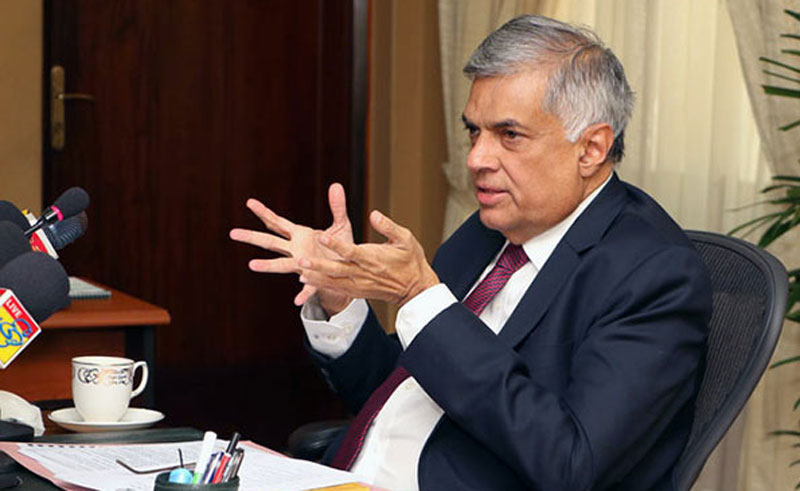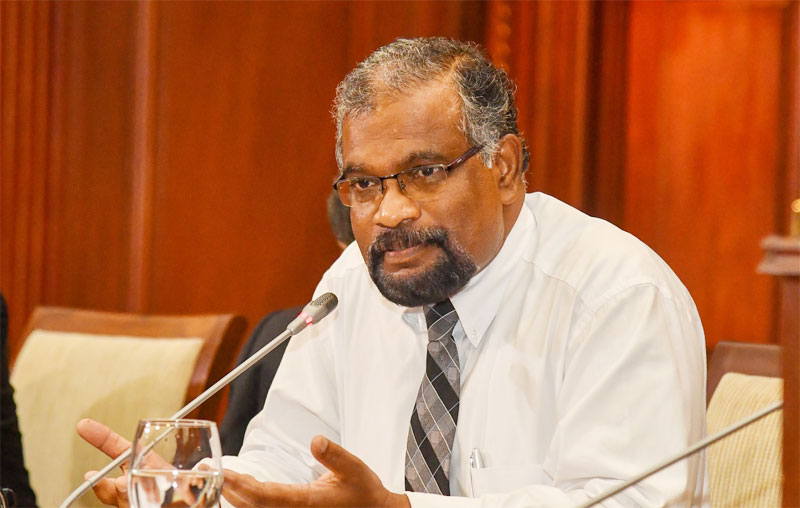Saturday Feb 21, 2026
Saturday Feb 21, 2026
Monday, 17 June 2024 01:53 - - {{hitsCtrl.values.hits}}

President and Finance Minister Ranil Wickremesinghe

Treasury Secretary Mahinda Siriwardena
The Government yesterday justified the new controversial property tax saying it was warranted to reach revenue goals and assured only the wealthy will be targeted.
The new tax has been indicated in publication of the International Monetary Fund (IMF) supported Extended Fund Facility (EFF) program related documents released last week. Those make reference to a proposed property tax to be implemented as an imputed rental income tax.
The Finance, Economic Stabilisation and National Policies Ministry said yesterday one of the key reasons for Sri Lanka’s deep, complex and unprecedented economic crisis is the sharp decline in Government tax revenue that led to high budget deficits and resultant escalation of public debt to unsustainable levels. Accordingly, the remedial measures to recover from the crisis have entailed a focused effort to improve the revenue of the Government. Revenue based fiscal consolidation has been implemented during the last two years in an attempt to bring Sri Lanka’s Government revenue from a record low 8.3% of GDP in 2022 to 15% of GDP by end 2025. In the year 2023, tax reforms focused on progressive corporate and personal income tax measures. In 2024, revenue enhancement is supported by Value Added Tax (VAT) reforms, including elimination of most exemptions and rate adjustments.
Thus far, the revenue targets for 2023 have been largely met and the target for 2024 is on track to reach the required level of 13.5% of GDP by end 2024. Therefore, there remain 1.5% of GDP revenue gains expected in 2025 in order to reach the 15% of GDP revenue target. The main revenue measure expected to help achieve the 2025 target is a wealth tax that is focused on property. From the outset of the IMF program approval in March 2023, the revenue measures expected in 2023, 2024, and 2025 have been clearly presented in the public domain.
The envisaged property tax is in an advanced stage of design and therefore, it is premature to outline specific details of rates and thresholds. However, the focus of this tax is on high wealth individuals, and not on average income earners. This objective will be achieved by a suitable tax-free threshold to ensure that the tax is targeted on very high value property or multiple properties that are owned by wealthy members of society. This specific targeting is evidenced by the fact that the tax is expected to yield 0.2% of GDP by 2025 and 0.4% of GDP in a full year in 2026.
The design of the tax will also ensure appropriate set off mechanisms to avoid double taxation and any elements that distort economic incentives. Property taxes are implemented in many countries (including developing countries like India) since they are considered to be a highly efficient, progressive, and non-distortive means of generating revenue to fund public services.
The tax is expected to go through the regular legal process of amendments to the required legislation and is expected to come into force in April 2025.
In addition to completing the legislative process, there is significant administrative work required to be done in terms of improving valuation mechanisms and databases in order to implement this proposed tax measure that was first announced in March 2023 with the publication of IMF program documents. In fact, that is not a new tax measure.
The Inland Revenue Act No. 10 of 2006 included a similar imputed income calculation termed “Net Annual Value.” Property in Sri Lanka is also subject to existing taxes such as local authority rates and Stamp Duty – therefore, there is significant precedence for such a property tax.
The continued improvement of Government revenue and associated reduction in budget deficits has supported the Government’s efforts to restore economic stability, and has helped bring down interest rates and support appreciation of the currency, which brings with it material improvements to all citizens. A failure to reach the required level of Government tax revenue that can fund public expenditure would lead to a recurrence of the economic crisis that had devastating impacts on the entire country.
